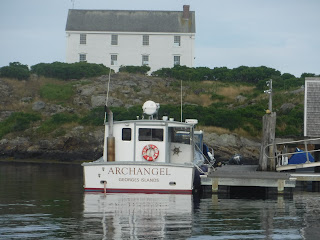In 1605 George Weymouth headed to what we now call America. His ship, the Archangel, ran into the shallow waters of Cape cod Bay, turned east and sailed downwind until he hit Monhegan Island. They spent a night anchored in its inhospitable harbor, then found a cozy spot, now known as Georges Harbor, at the mouth of the St. George River and Muscongus Bay.. It is protected by four islands - a great refuge from the sea. They spent some time exploring the area, trading, kidnapping some natives, etc.
If you've ever visited us in Maine in fair weather you've been to the spot. Last summer, aboard Ralph and Hannah Wolf's Caleru, we replicated part of that voyage. We spent a peaceful night at Georges Harbor, anchored just off Andrew and Betsy Wyeth's place, near the granite cross the State of Maine placed in 1905 to mark the tercentennial.
- GWC
Feb. 2, 2022
Nestled in the Atlantic Ocean, five miles off the coast of the picturesque town of Port Clyde, Maine, lie two rugged islands with stories to tell. Allen and Benner, as they are called, have witnessed a string of inhabitants over the centuries, from the Abenaki people and English colonists to homesteading lobstermen. And then came Betsy and Andrew Wyeth — mid-coast Maine locals and the most high-profile members of what many consider the first family of American art.
After the death in 2020 at age 98 of Betsy James Wyeth, the notoriously formidable adviser, collaborator, business manager, muse, and wife of the realist painter Andrew Wyeth, a polarizing figure in American art history, the keys to the castle are now passing to a far younger generation. (He died in 2009 at 91.)
Colby College of Waterville, Maine, around 75 miles inland from the islands, is set to announce it has acquired Allen and Benner from the family’s two foundations, Up East and the Wyeth Foundation for American Art. The Colby connection could breathe new life into a name that has been lacking in youthfulness for some time.















